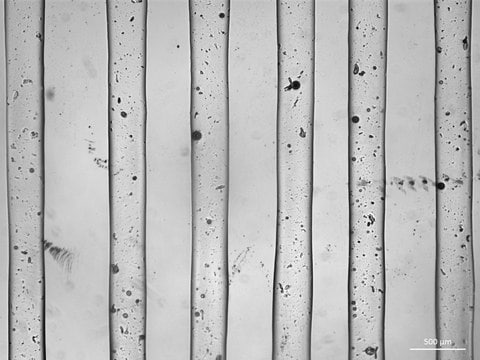933872
Carboxymethyl cellulose glycidyl methacrylate
Degree of methacrylation ~10%
Synonym(s):
CMC methacrylate, Cellulose acrylate, Cellulose methacrylate, Methacrylated CMC, Methacrylated cellulose
Sign Into View Organizational & Contract Pricing
All Photos(1)
About This Item
Linear Formula:
((C6H7O5)x(C12H13Na3O8)y(C24H33O14)z
UNSPSC Code:
12352201
NACRES:
NA.21
Recommended Products
Related Categories
General description
Cellulose based hydrogels are used to develop new materials for myriad applications in various fields, such as biomedical engineering (tissue engineering, wound dressing, drug delivery system), development of smart materials (sensors, actuators), advancement in healthcare and hygienic products (diapers, napkins) along with improvement in agriculture (pesticide carriers, water reservoir, water retention). The research boom in the different array of CB hydrogels has ensued hundreds of patents and numerous research articles, which have been published in recent times.
Application
- Hydrogels
- Tissue engineering
- Bioprinting
- Drug delivery system
Features and Benefits
- Methacrylate functionalized cellulose derivative
- Photocrosslinkable
- Chemical Crosslinkable
- Naturally derived polymer
Storage Class Code
11 - Combustible Solids
WGK
WGK 3
Flash Point(F)
Not applicable
Flash Point(C)
Not applicable
Certificates of Analysis (COA)
Search for Certificates of Analysis (COA) by entering the products Lot/Batch Number. Lot and Batch Numbers can be found on a product’s label following the words ‘Lot’ or ‘Batch’.
Already Own This Product?
Find documentation for the products that you have recently purchased in the Document Library.
Ryan J Hickey et al.
Frontiers in bioengineering and biotechnology, 7, 45-45 (2019-04-11)
In this review, we highlight the importance of nanostructure of cellulose-based biomaterials to allow cellular adhesion, the contribution of nanostructure to macroscale mechanical properties, and several key applications of these materials for fundamental scientific research and biomedical engineering. Different features
Our team of scientists has experience in all areas of research including Life Science, Material Science, Chemical Synthesis, Chromatography, Analytical and many others.
Contact Technical Service





